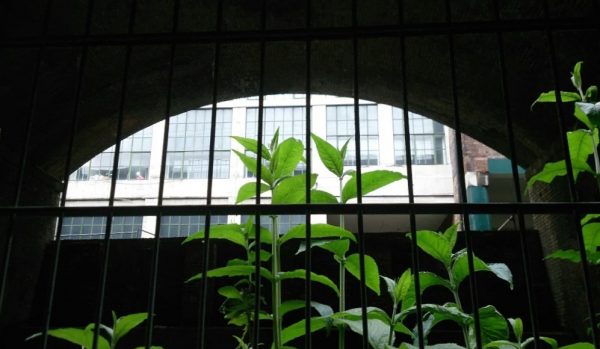
Today I realised I had 1,025 items saved to my Pocket account, which is a bit much. I wrote earlier this year about my article ecosystem, but it’s fallen apart a bit, because I never seem to get around to actually reading everything I save. I decided to clean out these items, deleting articles I was never really going to read, and sharing those that left an impression.
Architecture and Appropriation / Louis Mokak, Assemble Papers
First published in Caliper, this short piece speaks to how First Nations ‘culture is not a research topic, thematic concern or an anthropological curiosity’, yet is still treated as such by scientific lines of enquiry. The author, a Djugun architecture student, reflects on the power structures that underpin his chosen profession, and where cultural appropriation might be replaced with a more equitable exchange.
The Soviet web: the tale of how the USSR almost invented the internet / Justin Reynolds, Calvert Journal
This article on socialist cybernetics, in particular the Chilean Project Cybersyn and the Soviet OGAS, outlined how communist countries looked to emerging computing technologies to assist in centralised control of the economy. Crucially, the ‘internet’ of the title refers not to a publicly-accessible web of information, but a network of computers that would relay data on production output to central planning. They almost created a nation-wide computer network, but the Americans beat them to it, and look where that’s gotten us…
Energy Hogs: Can World’s Huge Data Centers Be Made More Efficient? / Fred Pearce, Yale Environment 360
Newsflash: the internet is terrible for the environment! As I highlighted in the last #emptythepocket roundup, we as a society have collectively forgotten that ‘that ethereal place where we store our data, stream our movies, and email the world has a physical presence’. And it’s filthy. The electricity that powers cloud computing is frequently drawn from non-renewable sources, with data centres using insane amounts of energy in cooling and airconditioning. Every internet-connected keystroke has an environmental cost. We outsource so much of our data infrastructure to ‘the cloud’, and assume that someone else will take care of all that pesky maintenance and environmental sustainability for us, that most of us have no idea what the internet is doing to the planet. (I’m hoping to soon read J.R. Carpenter’s book The Gathering Cloud, an intriguing work of ‘media meteorology’.)
Librarian or librarian: Which Do You Want to Be? / Jessica Olin, Letters to a Young Librarian
Our endgame as librarians / Andrew Finegan, Bibliotheque Bound
I am hugely, immensely, absolutely guilty of being a Librarian with a capital L. And yet it’s something I’ve largely refused to feel guilty about, because that’s a decision I’ve made for myself, in deciding what I want to do with my life and how best to use my skills and talents for the greater good. But it also means I’m up to my eyeballs in Librarian Culture, and when it almost drowned me earlier this year I realised it comprised such a large chunk of Me that I didn’t quite know what was left. Like Jessica, I also don’t want to look back on my mid-twenties and regret being such a Librarian, when I could also have been (just?) a librarian, with time and energy for other things. But do I want that? Would I ever be happy not throwing myself into my work?
Andrew posted on a similar topic as I was reading Jessica’s post. Andrew and I have collectively spent a lot of time this year being capitalised Librarians, giving a shit, and pondering our respective powers and places within LIS. We can’t do it all, and we can’t do it alone, and sometimes we can’t do much of anything. But we can try, and plan, and agitate, and celebrate all successes no matter how small. And I know I can do it from the position I’m currently in—employed on a fixed-term contract, in a non-management role, in a team that doesn’t share my views on… virtually everything, with the ink still wet on my library degree, armed only with a twitter account and my wits. Nobody else will change our sector for the better, so we might as well do it ourselves. Just so long as that’s not the only thing we do. (I was also reminded of Ruth Kitchin Tillman’s code4lib editorial on being a selfish librarian, which is a good read.)
Contraflow / Clare Archibald, Walking Heads
At this point I inverted my pocket so the oldest items were at the top. The most interesting old thing was this psychogeographic drift in a multi-storey carpark. As a lifelong non-driver I rarely have cause to be in these buildings, so reading Clare’s pedestrian exploration of this car-shaped space was spooky in lots of ways. It becomes less about the carpark itself than about Clare’s memories of carparks in general, concrete and acid, cracks and headlights. Cars are awful. I don’t know why we persist with them.
‘I felt betrayed by the physical and emotional hardship’ / Agustin Chevez, SBS Insight
As a product of the Enlightenment, LIS prides itself on being a rational profession, based on truth and evidence. But what if it’s really the absurd that will save us? Recent PhD graduate Agustin Chevez found himself seized by a need to walk from Sydney to Melbourne, and decided to do so, but a month of walking had seemingly produced nothing. Tired and unsure, he stopped by the side of the road, only to realise that ‘once artificial intelligence has modelled every possible rational scenario, absurdity might surface as our last standing trait’. The absurdity of his situation liberated him, and inspired him to continue his walk. The clickbaity title does this piece a great disservice—it’s an inspiring treatise on the value of irrationality and solitude. I could do with a long walk myself…